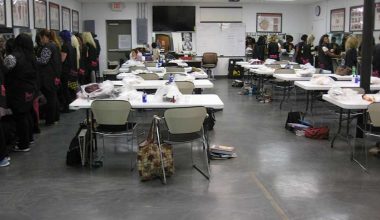Every school with religious institution is called a parochial school. But most time people get confused, you hear them ask, what is the different between a catholic school and a parochial school?
A parochial school is any educational facility connected to a particular religion.
The goal and purpose of the school is to support each student’s adherence to and development of their faith. Many parents want their kids to learn about religion and go to school.
A parochial school is one where both your adopted religion and your family’s religion are used to teach the subject, whether it be science or history.
So, in this article we will answer the question What is The Difference Between a Catholic School and a Parochial School? that has kept a lot of people confused.

Table of Contents
About Parochial School
A parochial school is a private elementary or secondary school that is associated with a particular religion.
Its curriculum combines secular disciplines like science, arithmetic, and language arts with general religious education.
Since “parish” shares a root with the word “parochial,” parochial schools were initially the educational arm of the neighborhood parish church.
Christian schools or “church schools” are the terms used to describe Christian parochial institutions. “Separate schools” is the term used in Ontario for parochial schools.
There are religious schools connected to Jewish, Muslim, and other groups in addition to those managed by Christian organizations, although these are typically not referred to as “parochial” due to the term’s historical relationship with Christian parishes.
Parochial School vs Catholic School
Some individuals conflate the terms “Catholic school” and “parochial school.” A school might be both under some circumstances, although it’s not often the case.
What is Parochial School?
There are schools established by Christian organizations in addition toA private school connected to a religious organization is known as a parochial school.
That organization is frequently a church. That church is frequently a Catholic one, though occasionally it isn’t.
If a school has a close connection to a house of religion, some people may refer to it as parochial.
However, because “parochial” derives from the word “parish,” the term “parochial school” often refers to a Christian organization, most specifically a Catholic one.
Read Also How Do I Become a Private Tour Guide in 2023? Full Explanations with FAQs
Are Most Catholic Schools Congregate-Only?
The National Center for Education Statistics estimates that 60% of Catholic schools are parochial, or connected to a particular church. But the others are not.
For instance, your community can have a Catholic school that offers religious instruction without being affiliated with any particular church.
What Type of Teaching is Provided at Parochial Schools?
The same state regulations that apply to other private schools also apply to parochial schools.
In addition to teaching the required subjects of arithmetic, science, and reading, they also provide a religious education.
Like other Christian schools, parochial schools might allow pupils to participate in sacraments like First Communion and/or Confirmation.
Is Parochial School Open To anyone?
Each parochial school choose which pupils they admit because they are private.
Some might insist that everyone in the family attend the linked church. Few would not, although they might charge non-members higher tuition.
Some parochial schools favor students who identify as Catholic or with whichever faith, while others might not.
It’s interesting to note that the National Association of Episcopal Schools “parish school” rather than “parochial school” to avoid giving the impression that one’s religion is more important than other things.
On their website, They write: “Parish schools are formed and exist to serve the educational needs of the entire community, not just those of parishioners.
They demonstrate by the fact that an Episcopal parish school or early childhood education program serves a population that is diverse in religious heritage and allegiance, with an average student body of roughly 25% Episcopals.
However, some parochial schools actively work to recruit students from all religious and cultural backgrounds.
8 Parochial School Near Me
#1. Thayer Academy
Thayer Academy is a private, coed day school for students in grades 5 through 12, in Braintree, Massachusetts. Each student at Thayer is recognized, linked to, and ready.
Because of the way the timetable is set, students can participate in sports, the arts, and performing arts while still being active and engaged students. With an average class size of 14 and a student-to-faculty ratio of 6:1, Thayer fosters genuine intellectual collaboration.
The Upper School provides 26 varsity sports, 85 electives, 16 AP courses, and specialized academic programs include Global Scholars.
There are 12 main stage productions at the Upper School and 11 in the Middle School. Thayer is reachable by public transit and also has bus services.
The goal of Thayer Academy is to encourage a varied community of students to strive for moral, intellectual, aesthetic, and physical excellence so that they can all achieve success and advance society.
The annual cost of tuition is $56,295
For the current academic year, tuition may have changed based on the highest grade available.
- Received 35% financial support
- Financial Aid is $33,780 on average
#2. Notre Dame Academy
In HINGHAM, Massachusetts, there is a well regarded private, all-girls Catholic school called Notre Dame Academy. With a student-teacher ratio of 8 to 1, it has 427 pupils in grades 7 through 12. The cost of tuition for the top grade available is $24,575. After graduating, every single student from this institution enrolls in a four-year university.
$24,575 for tuition per year
#3. South Shore Christian Academy
Here in South Shore, we have professors who are devout followers of Christ, morning chapel, and we impart a Christian worldview to the Ontario curriculum.
South Shore believes in religious education as the Bible says
“Train up a child in the way he should go, and when he is old he will not stray from it.” Psalms 22:6
Why opt for a Christian institution? They center a child’s education around the Lord Jesus Christ. It maintains the accuracy and supremacy of the Bible. It offers solid backing for the morals and principles of a Christian home.
School Life at South Shore
We at South Shore welcome you with open arms as soon as our doors open at 8:30 a.m. Many parents and younger siblings gather in the chapel area as students head to class and get ready for the day.
Morning announcements, Bible tales and passages, music, and prayer kick off our school day in the chapel. As we worship together, parents, grandparents, and babies are among our visitors! Christian principles are emphasized in a class all day long as we show students how to treat one another with love and respect by using Jesus as an example.
All grades get daily Bible instruction, and goal is to honor God in everything we do.
#4. Cardinal Spellman High School
The Catholic school Cardinal Spellman High School is situated in BROCKTON, Massachusetts. With 462 students in grades 9 through 12, it has an 11 to 1 student to teacher ratio. The cost of tuition for the top grade available is $16,850.
96% of graduates from this institution continue their education by enrolling in a four-year university.
Financial Aid Received 58%
$5,750 on average in financial aid
#5. Calvary Chapel Academy
Calvary Chapel Academy’s mission is to collaborate with parents Christians, to offer Christian education of the highest caliber, and to equip students for a lifetime of Christian service.
The school’s mission is to develop godly youth who love the Lord with all their heart, mind, soul, and strength, serve Him via their vocations and in their local churches, and worship the Lord in the splendor of holiness.
Theire mission of the school is to provide a Christian worldview on a biblical foundation centered on Christ.
Calvary Chapel Academy’s instructional objectives are to foster the growth of godly character in a supportive Christian atmosphere and to deliver high-quality.
- The annual fee is $8,900
Read Related Article What is Intervention in Education (Full Explanation with FAQs)
#6. Bay Farm Montessori Academy
A buzzword, Montessori is much more than that. The teaching strategies used at Bay Farm, are fully accredited by the American Montessori Society and focus on the unique developmental requirements of the child.
Dr. Montessori did extensive education research and concluded that each person learns differently and at their rate.
To accommodate and encourage the students’ unique interests, developing a new kind of classroom setting known as a prepared environment.
Bay Farm gives kids life skills to prepare them for success, from encouraging self-care in the Toddler House to emphasizing time management techniques in Elementary.
Here at Bay Farm, you won’t find teacher lectures or desks lined up. Students can benefit from outdoor adventures and hands-on learning on the 9-acre site.
- Tuition is $22,475 per year
- Financial Aid Received 45%
#7. Inly School
The Montessori+ concept of Inly is an original strategy created to bring out the best in kids. The Montessori+ program, is implemented by teachers who are specialists in child growth and development, gives kids the skills they require at the ideal time.
Students become academically competent, gain creativity and critical thinking abilities, and evolve into self-assured learners and compassionate global citizens.
At Inly, students thrive in a happy environment where they have possibilities for academic success and personal development as well as a sense of belonging.
The Montessori-plus curriculum combines a student-centered philosophy with in-depth academics and experiential learning to motivate students to develop into passionate, inquisitive thinkers.
- $44,300 for tuition each year
- Financial Aid Received 26%
- $13,600 on average in financial aid
#8. St. Francis Xavier School
The school believes that since we are all created in the image of God, St. Francis Xavier College values and respects every individual. The school is dedicated to embracing diversity and dismantling the ideologies, structures, and behaviors that marginalize, divide, or oppress individuals.
People of all abilities, colors, cultures, religious beliefs, socioeconomic statuses, gender identities, and sexual orientations are welcome at St. Francis Xavier College.
St. Francis Xavier School in SOUTH WEYMOUTH, Massachusetts, is a private Catholic school. With 301 kids in grades PK–8, there are 16 students for every teacher.
The Parochial Schools Significance
Majority of the private, non-public schools in America have historically been Catholic institutions, elementary schools associated with a nearby parish church.
Parochial schools were first intended to uphold Catholicism and its culture, fending off the perceived threat that Protestantism posed.
What Is a Parochial School Use For?
Serving the spiritual, academic, emotional, social, and cultural needs of pupils in a faith community is the responsibility of a parochial school.
The main goal of most parochial schools is to educate children in a Christian setting.
Children’s character, morals, and values are based on the spiritual component of religious schools. Among the traits of a parochial school are:
- Religious commitment and goal
- Teachers that are involved in the school’s ministry
- A program of study that covers the fundamentals of reading, writing, math, social subjects, and religion
- The dissemination of moral and ethical principles
- Acurriculum that covers career preparation
- A vibrant feeling of community that includes a sense of purpose and service
The purpose of parochial school is to exalt God and spread Christian ideals. There are billions of non-Christians and people of other faiths in the world.
As a result, some parents enroll their kids in parochial schools so that they can learn values-aligned teachings.
These schools established in the US is a means of educating those who are having challenges, due to financial constraints, could not afford to send their children to public schools.
What are The Reasons to Consider a Parochial School?
There is a lower student-teacher ratio, which means more individual
Due to the discipline that these institutions instill in their kids, many people favor them.
Smaller class sizes and a low student-teacher ratio also allow for more individualized instruction from teachers for each student.
All this will enable teachers to recognize pupils’ areas of strength and weakness and cater to their needs accordingly. Furthermore, several of these colleges have cheaper tuition costs.
Substantial Parental Involvement
Parental participation is frequently very high in parochial schools. For instance, parents can volunteer as teachers, field trip leaders, and in other roles.
Various school expenses not covered by tuition or donations will probably be funded by the parent organization as well.
Private schools provide a range of extracurricular opportunities.
You should be aware that a parochial school is different from a regular school if you intend to enroll your child there.
Instead, it involves extracurricular pursuits like athletics, the arts, music, and other things that will serve as a child’s fundamental foundation when they get older.
Every parochial school student has free access to sports, crafts, and other activities. However, majority of these events are only open to parochial school kids.
For instance, the area’s private schools frequently offer soccer leagues to students who attend the nearby schools.
This enables students from various schools to participate on the same squad, develop their abilities for working as a team, and make friends with kids from other schools.
FAQs
Nonsectarian and religious private schools are also available (the term parochial typically refers to Catholic schools but can also refer to schools of other religious faiths and denominations).
Jewish or other religious schools that are closely associated with a place of worship referred to as parochial by some.
As “parochial” is related to the word “parish,” however, the term “parochial school” often refers to a Christian organization, most specifically a Catholic one.
A school that offers religious teachings, particularly Christian instruction
After the Second World War, in 1947, Bishop Pedro Santos established Naga Parochial School at the Casa Parroquial.
The Daughters of Charity’s initial school, which evolved into the Colegio de Santa Isabel, was housed in the same “casa” in the late 1860s. Msgr.
Conclusion
From the above post, you understand that a parochial school is an independent school that operates by different religious organizations known as parochial schools. Regardless of their family’s religious affiliation.
Students attending a parochial school come from nearby parishes to the parish where they are located.
These institutions’main goal is to give their students the education they require to excel in life and their chosen careers.
Since religion is a component of culture, it is crucial to teach kids about diversity and cultural understanding. We hope this was helpful.
References
- en.m.wikipedia.org _____ Parochial school
- niche.com _____ What Is a Parochial School?
- imshero.com _____ What Are Parochial Schools



